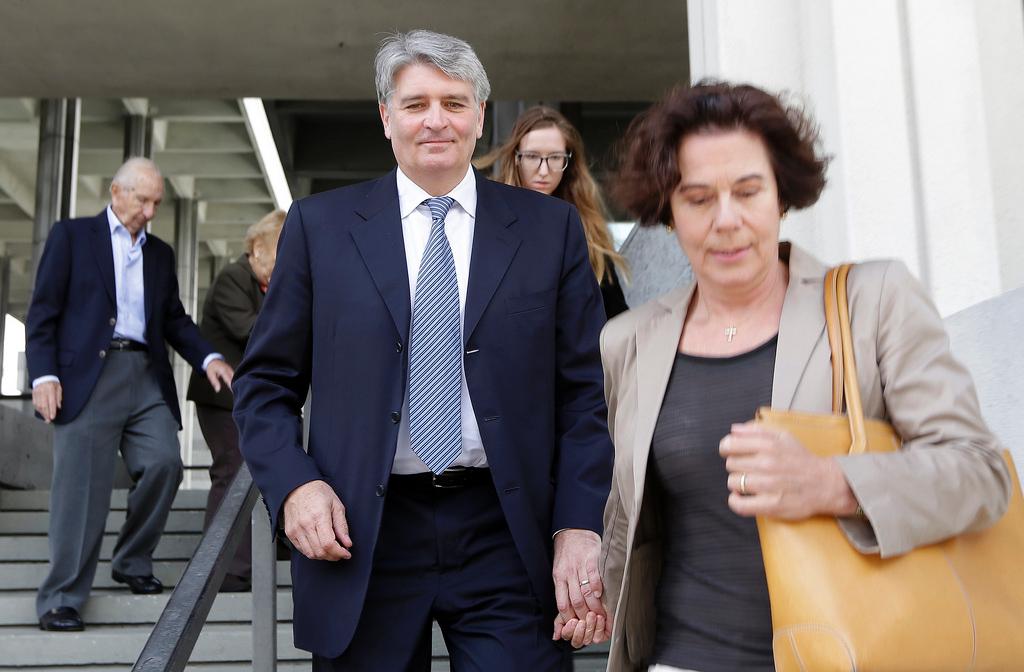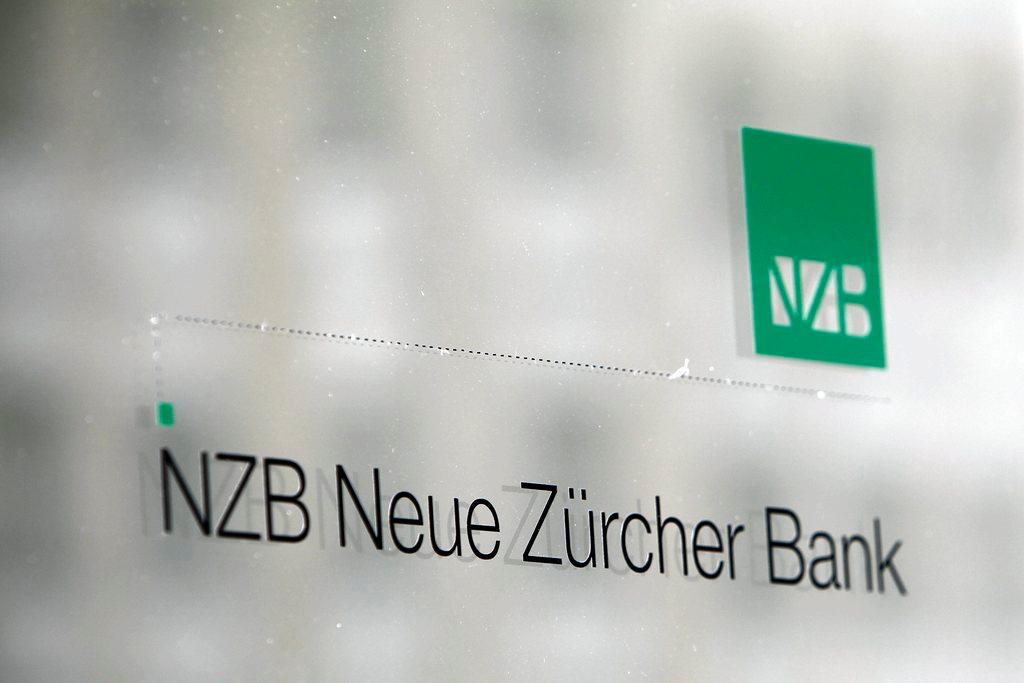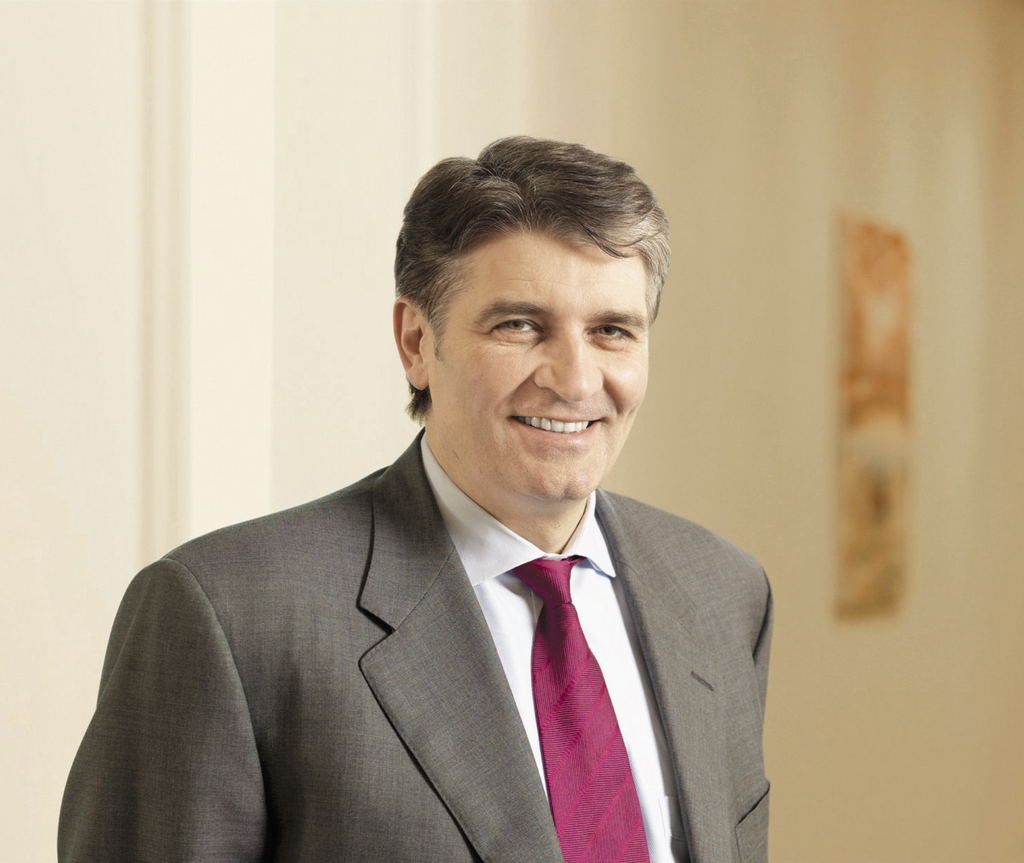Ex-UBS executive Weil acquitted in tax probe

Raoul Weil, who headed global wealth management at Swiss bank UBS, has been found not guilty of conspiring with wealthy Americans to hide $20 billion (CHF19.25 billion) in secret accounts from the Internal Revenue Service (IRS).
Jurors deliberated for just over an hour before returning the not guilty verdict on Monday. Weil had faced up to five years in prison and a $250,000 fine if convicted of conspiring to defraud the US government.
“We’re obviously pleased with the verdict. This was a case that should never have been brought,” said Weil’s lawyer, Matthew Menchel.
A spokeswoman for prosecutors said they respect the jury’s verdict.
“This decision will not impact the department’s ongoing commitment to holding offshore tax evaders and those who aid them accountable,” US Department of Justice spokeswoman Nicole Navas said in an email.
In the courtroom, Weil hugged his wife and lawyers, clenching both fists when the verdict was announced.
Afterwards, in an interview with Swiss public television, SRF, Weil thanked those who had supported him during his “six-year nightmare”. He said he wanted to return to Switzerland and finally see his parents and dog again.
But it was a mockery, in his opinion, that people could travel to the United States and violate Swiss banking secrecy and admit to money laundering there and then not be prosecuted in Switzerland.
Weil was the highest-ranking Swiss banker prosecuted under an IRS and justice department crackdown on Americans’ use of offshore accounts to dodge US taxes. In 2009, UBS paid a $780 million US fine and disclosed names of thousands of American account holders to the IRS, many of whom were later prosecuted.
The Swiss authorities said it remained to be seen what the acquittal would mean for the tax dispute between Switzerland and the US, although a finance ministry spokesman said the acquittal was “not negative” for Switzerland.

More
Acquittal for former UBS manager
‘Story of greed’
In a closing argument, prosecutor Jason Poole said the case against Weil was simple: he did everything he could to promote and protect a profit-making business that was highly illegal for US taxpayers.
“It’s a simple story of greed and making money,” Poole said. “It’s simple, straightforward, offshore tax evasion. He was participating in it. He was involved.”
Weil, 54, did not testify and his defence attorneys put no witnesses on the stand. In his closing argument, Menchel blamed wrongdoing on lower-ranking UBS bankers acting without Weil’s knowledge and suggested many of the government’s ex-UBS witnesses were unreliable because they were given immunity from prosecution.
“Who are the criminals here? Who are the ones that should be punished instead of getting sweetheart deals?” Menchel said. “It had nothing to do with Raoul Weil or anybody above him.”
Whose fault?
Menchel also suggested it was the wealthy Americans who were to blame for evading taxes because bank secrecy was protected by Swiss law.
“Whose obligation was it to pay the taxes? The taxpayer’s,” he said.
The trial centred on events that took place from 2002 to 2008, when Weil was UBS global head of wealth management. He left UBS in 2009 and had been chief executive officer at another Swiss bank, Reuss Private Group, since 2010. He was arrested while on holiday in Bologna in 2013 on a US fugitive warrant.
In all, prosecutors said about 17,000 US taxpayers concealed assets from the IRS in the UBS accounts.
Another former UBS banker, Bradley Birkenfeld, provided US officials with a vast trove of information that pierced the veil of secrecy that has long hidden Swiss bank accounts. Birkenfeld nevertheless served more than two-and-a-half years in federal prison for his role in the tax evasion, but then was awarded more than $104 million by the IRS under a whistle-blower programme.
Media reaction
“Years of investigation, millions of pages of documents, first-class witnesses and, ultimately, an acquittal,” said the French-language news magazine Hebdo, pointing to the prosecution’s lack of smoking-gun evidence.
The Neue Zürcher Zeitung agreed it had failed to present witnesses or material that would prove Weil’s guilt beyond doubt.
The prosecution, it said, seemed to hope that jurors would base their decision on the “cling together, swing together” principle, i.e. the mere existence of UBS’s business model for helping US clients allegedly dodge tax would be enough to see Weil found guilty.
While the paper said some observers might have sympathised with this – “how can highly paid top managers with leadership and surveillance roles always be able to simply hide behind their lawyers?” – ultimately not one piece of evidence, not one email, surfaced during the trial that indicated Weil’s guilt.
For Forbes business magazine, the verdict was a “big setback to the IRS’s juggernaut against tax evasion and offshore accounts”.
“One lesson of Mr. Weil’s 2013 arrest in Italy on a 2008 tax indictment is the long reach and long memory of the federal government,” it noted. “But for those with the budget and intestinal fortitude to play it out, Mr. Weil’s case also shows that sometimes on some facts, an acquittal is possible.”
The Tages-Anzeiger in Zurich said the acquittal by a jury reflected the large and growing popular distrust of the justice system, which is seen as “extravagant and excessive”.
It added, however, that the verdict didn’t absolve the Swiss financial centre – “to understand [the verdict] as an invitation to carry on acting as henchmen for foreign tax evaders would be a fatal mistake”.
For Hebdo, at least one thing had been confirmed: “Swiss bankers were, and remain, the absolute experts in covering their tracks”.

In compliance with the JTI standards
More: SWI swissinfo.ch certified by the Journalism Trust Initiative












You can find an overview of ongoing debates with our journalists here . Please join us!
If you want to start a conversation about a topic raised in this article or want to report factual errors, email us at english@swissinfo.ch.